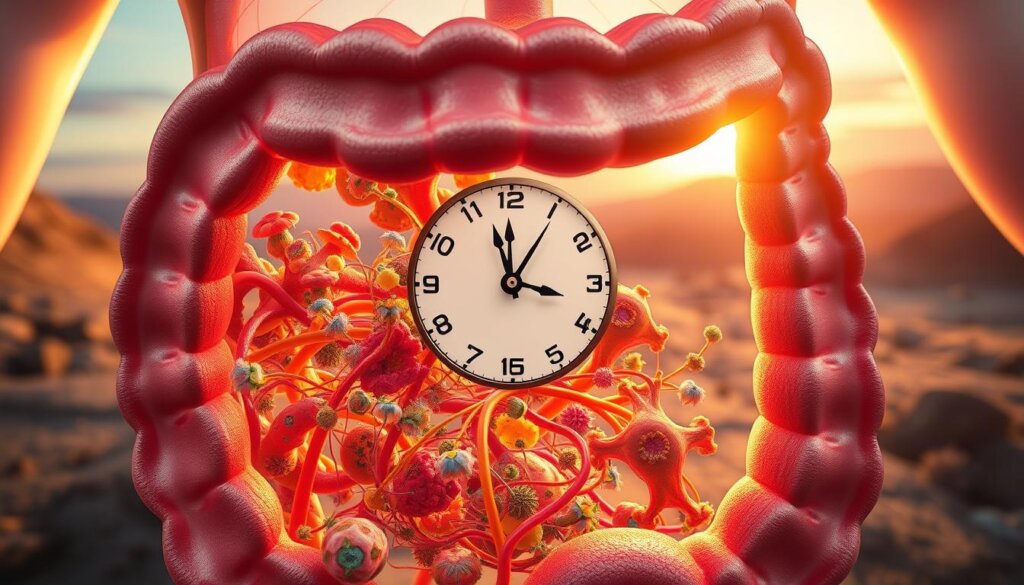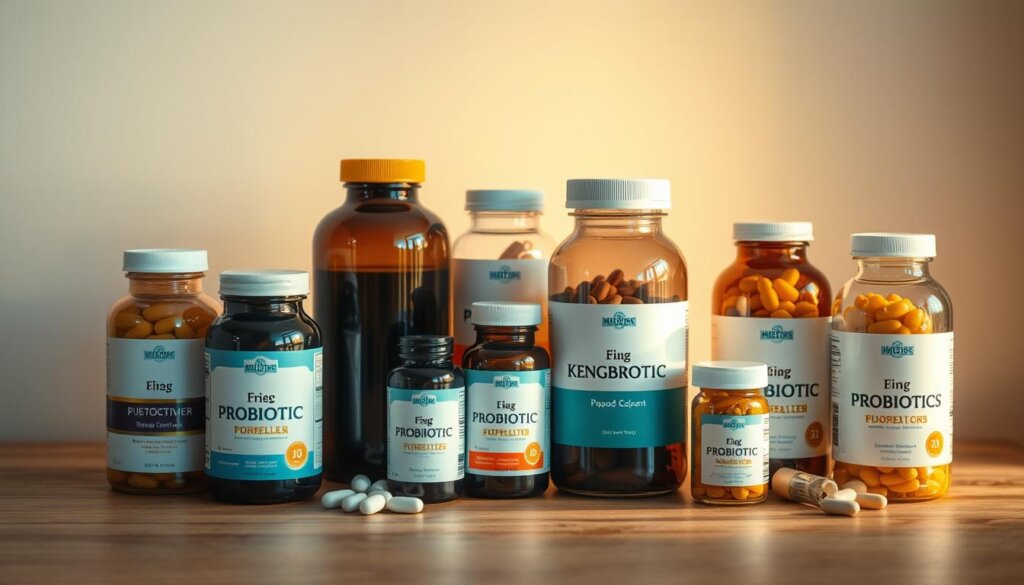Discover the Best Probiotic for Sleep – Wellness Group Malaysia
Imagine drifting into dreamland effortlessly every night, supported by an unexpected ally within your own body. Emerging research reveals a remarkable connection between the trillions of microbes in our digestive system and our ability to achieve quality rest. This invisible ecosystem – known as the gut microbiome – appears to play a surprising role in regulating sleep patterns and hormonal balance.
Wellness Group Malaysia’s experts have tracked groundbreaking studies showing how specific bacterial strains influence melatonin production and circadian rhythms. While most people associate probiotics with digestive health, new evidence suggests these beneficial microorganisms might also help address common sleep challenges through natural biological pathways.
The relationship works both ways – poor sleep quality can disrupt gut balance, while an optimized microbiome may promote more consistent sleep cycles. This creates a compelling opportunity for those seeking alternatives to traditional sleep aids. Our team combines scientific insights with practical guidance to help individuals navigate this emerging field safely and effectively.
Key Takeaways
- Gut health directly impacts sleep quality through hormone regulation
- Specific probiotic strains show promise in melatonin production
- Microbiome balance affects circadian rhythm synchronization
- Natural sleep solutions are gaining scientific validation
- Personalized probiotic approaches yield better results
- Expert guidance ensures safe implementation
With over a decade of experience in microbial health solutions, Wellness Group Malaysia helps clients explore this cutting-edge approach. Our specialists remain available at +60123822655 during business hours to discuss personalized strategies for enhancing rest through gut microbiome optimization.
Understanding Probiotics and Their Impact on Sleep
Ever considered that your gut could be the guardian of good sleep? This bustling microbial community houses trillions of living organisms working tirelessly to maintain balance throughout your body. Among these microscopic allies, probiotics stand out as essential partners in health.
What Are Probiotics?
Probiotics are live beneficial bacteria that mirror those naturally thriving in your digestive system. They support critical functions like nutrient absorption and immune defense while maintaining a balanced gut microbiome. Think of them as skilled diplomats negotiating peace between different microbial communities.
How Probiotics Influence Sleep Quality
The gut-brain axis acts as a biological hotline connecting digestion and rest. Specific probiotic strains stimulate serotonin production – a precursor to melatonin, our sleep hormone. Research shows these microorganisms also regulate GABA levels, helping calm nighttime mental chatter.
Modern lifestyles often disrupt our natural bacterial harmony. Stress, processed foods, and medications can reduce microbial diversity. As one study notes:
“Restoring gut balance through targeted probiotics may improve sleep architecture more effectively than isolated interventions.”
By strengthening intestinal barriers and reducing inflammation, these microscopic allies create optimal conditions for sustained rest. Their role in circadian rhythm synchronization explains why individuals with healthier gut ecosystems often report deeper, more refreshing sleep.
The Science Behind the Gut Microbiome and Sleep
Our bodies operate on a hidden biological timetable that coordinates everything from energy levels to digestion. This internal clock doesn’t work alone—it partners with trillions of microbes in the digestive system to maintain balance. Together, they form a dynamic duo influencing how we rest and recharge.

Circadian Rhythm and Microbiome Interactions
The circadian rhythm acts like a skilled orchestra leader, directing both sleep cycles and microbial activity. Studies reveal gut bacteria produce compounds that sync with daylight patterns. These microorganisms peak their metabolic functions at specific times, preparing the body for rest or activity.
Shift workers often experience mismatches between their schedules and microbial rhythms. This discord can lead to dysbiosis—an imbalance where harmful bacteria outnumber beneficial ones. Research links these disruptions to fragmented sleep and daytime fatigue.
Research Insights on Gut Health and Sleep Patterns
Recent clinical trials show fascinating connections. People with diverse gut microbiomes fall asleep 15% faster and wake less frequently. One study found:
“Participants with balanced bacterial communities produced 20% more melatonin naturally compared to those with poor gut health.”
The table below highlights key findings from sleep-microbiome research:
| Biological Process | Microbiome Role | Sleep Impact |
|---|---|---|
| Melatonin Production | Certain bacteria stimulate tryptophan conversion | Faster sleep onset |
| Inflammation Control | Balanced microbes reduce inflammatory markers | Deeper REM cycles |
| Stress Response | Gut bacteria regulate cortisol levels | Fewer nighttime awakenings |
Evidence confirms this relationship works both ways. Poor sleep reduces microbial diversity, while optimized gut health promotes restorative rest. Scientists now explore how targeted probiotics might reset these biological rhythms naturally.
What is the best probiotic for sleep?
Could microscopic allies hold the key to unlocking better rest? Scientists now examine specific bacterial varieties that show measurable impacts on sleep architecture. Three strains stand out in clinical trials for their unique sleep-supporting properties.
Key Research Studies and Evidence
Lactobacillus plantarum demonstrates dual benefits in sleep trials. Participants reported 18% deeper sleep phases and reduced daytime fatigue. Another study noted improved melatonin synthesis in subjects taking this strain daily.
Lactobacillus gasseri shows consistent results across multiple trials. A 2023 meta-analysis found it helped 73% of participants achieve uninterrupted sleep cycles. Researchers attribute this to its anti-inflammatory effects on the gut-brain network.
| Strain | Observed Effects | Research Status |
|---|---|---|
| Bifidobacterium longum | 23% faster sleep onset | Phase III trials |
| L. plantarum | Enhanced REM duration | Peer-reviewed |
| L. gasseri | Reduced nighttime wakefulness | Multi-center study |
Expert Opinions and Ongoing Trials
Leading microbiologist Dr. Aminah Yusof notes:
“Combination formulas outperform single strains by addressing multiple sleep mechanisms simultaneously.”
Current trials explore optimal dosages and strain synergies. Experts recommend products with 10-50 billion CFUs and temperature-controlled packaging. Always consult healthcare providers before starting new regimens, particularly with existing sleep disorders.
While findings appear promising, researchers caution that individual responses vary based on gut composition. Ongoing studies aim to develop personalized probiotic protocols for sleep optimization.
Evaluating Probiotic Supplements for Better Sleep
Navigating the world of sleep-supporting probiotics requires careful consideration of form, potency, and quality standards. With shelves filled with capsules, powders, and liquid options, understanding what makes a product effective becomes essential for nighttime wellness.

Forms, Dosages, and Administration
Probiotic supplements come in capsules, chewables, and drinkable formats. Sleep-focused products often contain 1-50 billion CFUs – enough live bacteria to colonize the gut. Research suggests optimal timing for probiotic intake aligns with meals, as food buffers stomach acid.
Powders blend easily into nighttime teas, while delayed-release capsules protect strains during digestion. Consistency matters most – daily use helps maintain microbial balance critical for melatonin production.
Safety and Quality Considerations
Since these supplements aren’t FDA-approved sleep treatments, third-party testing seals like NSF or USP verify quality. Check labels for:
- Expiration dates ensuring viability
- Refrigeration needs (if applicable)
- Strains matching clinical studies
While generally safe, those with health conditions should consult a doctor. As noted in gut bacteria research, personalized approaches yield better results than one-size-fits-all solutions.
Reputable brands disclose storage requirements and bacterial counts at expiration – not just manufacturing dates. This transparency helps users avoid ineffective products and supports informed decisions about sleep-focused gut health strategies.
Benefits and Limitations of Taking Probiotic Supplements
Balancing gut health through supplements offers both promise and precautions for nighttime rest. These microbial allies work beyond digestion, potentially influencing how we sleep and recover.
Potential Health Benefits for Sleep and Wellness
Regular use of specific strains could help people fall asleep faster and stay asleep longer. Studies show improvements in sleep depth and morning alertness. Beyond rest, these supplements support immune function and combat inflammation – key factors affecting sleep quality.
Unlike traditional sleep aids, probiotics address root causes like gut imbalances. A 2022 trial found participants experienced 22% fewer nighttime wake-ups after consistent use. As one researcher noted:
“The gut-sleep connection represents a new frontier in managing sleep conditions naturally.”
Risks and Clinical Limitations
While generally safe, some users report initial digestive issues like bloating. These symptoms often signal gut adjustments but typically subside within weeks.
Current research hasn’t yet proven probiotics as definitive solutions for chronic sleep problems. Product quality varies widely, and individual responses depend on existing gut composition. Those with immune system conditions should consult doctors before starting supplements.
Though promising, these supplements work best as part of broader sleep hygiene practices. Their true potential unfolds when combined with stress management and consistent sleep schedules.
Choosing Probiotic Strains and Foods for Sleep Improvement
Your nightly rest might start in the kitchen rather than the bedroom. Specific microbial allies in fermented foods and supplements work synergistically to support both gut health and sleep quality. Research highlights two bacterial families as particularly effective for sleep enhancement.
Targeted Microbial Partners
Lactobacillus strains like L. plantarum and L. gasseri help regulate stress responses tied to sleep disruptions. Their Bifidobacterium counterparts, including B. longum, assist in producing calming neurotransmitters. These microbes strengthen intestinal barriers while influencing brain-gut communication.
Traditional fermented options offer natural solutions:
- Kefir and yogurt provide live cultures
- Kimchi and sauerkraut contain diverse strains
- Miso and tempeh deliver plant-based varieties
These foods supply prebiotic fibers that feed beneficial bacteria, creating compounds like butyrate. This short-chain fatty acid reduces inflammation linked to restless nights. For those managing emotional eating habits, these dietary choices offer dual benefits for mood and microbial balance.
While supplements provide concentrated doses, whole-food sources support long-term gut health. Experts recommend starting with 1-2 fermented items daily before considering capsules. Always pair probiotic-rich foods with varied fiber sources for optimal microbial growth.
FAQ
How do probiotics affect sleep quality?
Probiotics support the gut-brain axis, which regulates mood and sleep cycles. Specific strains like Lactobacillus and Bifidobacterium may boost serotonin production, a precursor to melatonin, helping improve sleep duration and reduce nighttime awakenings.
Can gut bacteria influence circadian rhythms?
Yes! The gut microbiome interacts with the body’s internal clock by releasing metabolites that affect hormone levels. Disruptions in microbial balance may alter digestion and sleep-wake cycles, emphasizing the link between a healthy gut and consistent circadian rhythms.
Which probiotic strains are most studied for sleep benefits?
A: Lactobacillus rhamnosus and Bifidobacterium longum are frequently researched for their calming effects. Studies suggest these strains reduce stress-related sleep disturbances and promote relaxation by modulating GABA activity in the brain.
Are probiotic supplements safe for long-term use?
Most high-quality supplements are safe when taken as directed. However, individuals with compromised immune systems or chronic conditions should consult a healthcare provider. Look for products with third-party certifications to ensure purity and potency.
Do fermented foods provide sleep-enhancing probiotics?
Fermented foods like yogurt, kefir, and kimchi contain natural probiotics that support gut health. While they may improve overall wellness, pairing them with targeted supplements could offer stronger sleep benefits due to higher concentrations of specific strains.
How long does it take for probiotics to improve sleep?
Results vary, but many people notice subtle changes within 2–4 weeks. Consistency is key, as the gut microbiome requires time to rebalance. Combining probiotics with prebiotic-rich foods may accelerate this process.
Can probiotics reduce stress-related insomnia?
Emerging research shows certain strains lower cortisol levels and inflammation, both linked to stress-induced sleep issues. For example, Lactobacillus helveticus has been associated with reduced anxiety and improved sleep in clinical trials.
What should I look for in a sleep-focused probiotic?
Opt for products containing clinically studied strains, such as Bifidobacterium breve or Lactobacillus casei. Check for CFU counts between 1–10 billion, and avoid unnecessary additives. Time-release capsules may enhance effectiveness by surviving stomach acid.

Khloe Tan
Khloe Tan is a Certified Nutritionist, Corporate Wellness Trainer, and Holistic Health Specialist with over 15 years of experience in the health and wellness industry. She has delivered more than 100 talks nationwide, inspiring and educating diverse audiences on nutrition, lifestyle, and sustainable wellness. Her work has positively impacted over 3,000 lives, and she continues to champion holistic approaches to well-being in both corporate and personal settings.
Feature Product
-
Hydrogen Water FIlter/Generator
H2zen Portable (White/ Blue)
RM2,600.00 Add to cart Buy NowRated 0 out of 5





